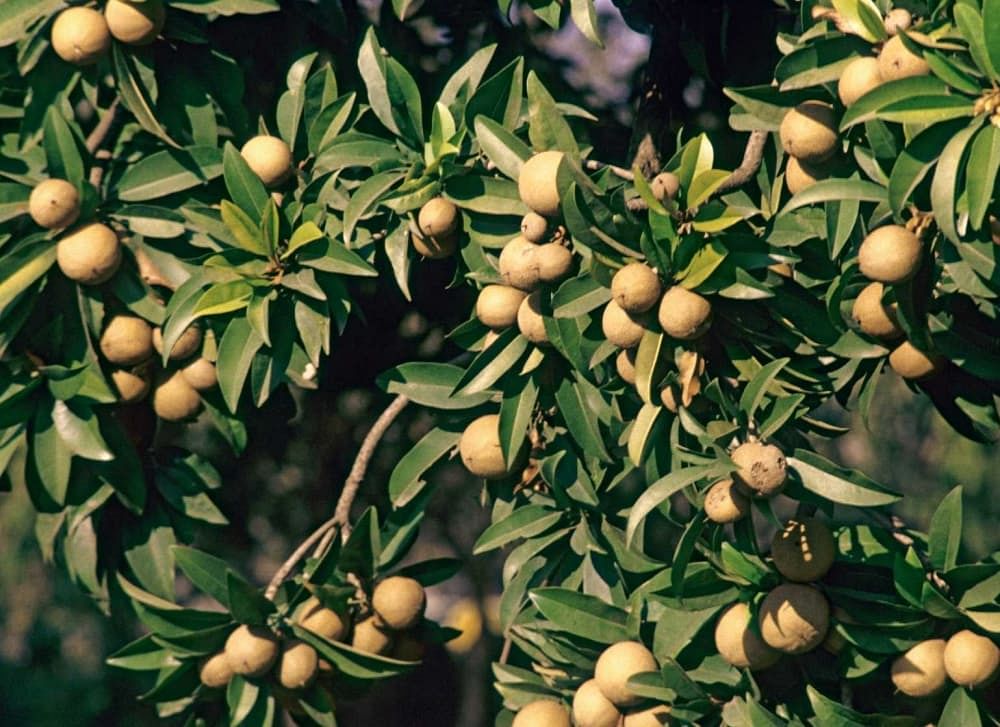What is Chikoo?
The tropical fruit chikoo belongs to the Sapotaceae family. It is a grainy grey-brown pulpy fruit with a sweet taste and a gritty texture. When unripe, the fruit is hard and produces saponin, but as it ripens, it softens. Chiku (Sapodilla) grows on evergreen trees that can only thrive in hot or warm areas. Flowering occurs throughout the year; however, fruit production occurs just twice a year.
The majority of modern Chikoo tree farming is for the purpose of harvesting 'chicle,' a sap from the tree's bark. India is the world's largest cultivator of the tree, which is grown mainly for its fruits. For the cultivation of gum, chikoo trees are native to southern Mexico and the Yucatan. Since ancient times, they have been grown across Central America, as well as in the West Indies, Bermuda, the Philippines, and the Florida Keys.
It is a high-calorie, low-fat, cholesterol-free fruit that aids in the maintenance of an active and healthy lifestyle. In India, it is known as a Chikoo, although it is also known as a Sapodilla in English or a Zapote in Spanish, and it is known as the Naseberry in the West Indies.
Chikoo Nutrition
Sapodilla is a high-calorie fruit, with each 100 g providing approximately 83 Kcal of energy. It has approximately 20 g of carbohydrates, is relatively low in fat, and has no cholesterol. It has a high dietary fibre content, roughly 5 g per 100 g of fruit. Vitamin C, Vitamin A, and other vitamins, including niacin, riboflavin, thiamin, and others, are all abundant in Sapodilla. It also contains a lot of magnesium, phosphorus, selenium, and zinc, as well as a lot of iron, copper, and calcium.
Chikoo Benefits
It is good for you to consider the health benefits of chikoo, considering the taste and the cost of the same. Due to the presence of vitamin C, chikoo not only strengthens the intestines but also enhances immunity and protects against numerous bacterial illnesses. Here are the 14 chiku benefits:
1. Boosts Immunity
Chikoo has a high volume of vitamin C and antioxidants in it, which aid in the development of your immune system. Polyphenols found in chikoo may help fight harmful poisons and reduce disease risk. It also possesses antibacterial and antiviral capabilities, which protect the body from dangerous germs and viruses.
2. Aids Bowel Movements
Since fibre-rich foods improve digestion and regular bowel movement, Sapota brings high fibre content, making it an effective bulk laxative. Constipation is relieved by the high fibre content, which also strengthens the colon's membrane and makes it resistant to infections. It regulates your digestive tract and protects you from irritable bowel syndrome (IBS), a common problem in India.
3. Keeps the Bones Strong
If you eat the chikoo on a regular basis, you may not need to take any supplements later in life. It contains minerals such as iron, folates, calcium, magnesium, potassium, zinc, copper, phosphorus, and selenium, all of which are necessary for a variety of physiological activities, including normal bone formation. It even keeps you away from the chances of getting muscle weakness, osteoporosis, and weak joints.
4. Good for the Eyes
Consuming one chikoo a day could help you avoid the eye doctor for years. Vitamin A present in it can keep our eyes healthy. It also helps in the formation of visual sensory cells that help improve eyesight at a young age. Also, upon consuming it at an older age, one can relieve themselves of extended troubles with the eyes.
5. Relieves Congestion
Chikoo's chemical compounds containing antibacterial and anti-parasitic properties have been discovered to aid in the prevention of congestion and persistent coughs by eliminating phlegm and mucus from the nasal tube and respiratory tract. Sapodilla (Chiku) fruits and blossoms are used to treat pulmonary symptoms such as coughs, colds, and congestion.
6. Prevents the Occurrence of Cancer
Chikoo contains a significant amount of antioxidants that have been shown to reduce the risk of certain types of cancer. It has a good amount of vitamins A and B, which aid in the upkeep of the body's various mucus linings. As a result, the chance of pulmonary and oral malignancies may be reduced.
Furthermore, chikoo is high in dietary fibre, which aids in the regulation of good bowel movements. This is crucial in preventing colon cancer from developing. The chikoo is high in dietary fibre, vitamins A and B, and vitamin C, as well as antioxidants. As a result, it has been linked to the prevention of some cancers, such as oral cavity cancer.
7. Energy Booster
Chikoo's natural fructose and sucrose concentration can provide a lot of energy to your body. It is a ready-to-use energy source. As a result, you can eat it during a workout or, if you have a long day ahead of you, take a chikoo before leaving the house for an extra boost. It provides a rapid blend of organic energy to the body. It is the finest fruit for youngsters and women who are pregnant to meet their increased energy demands while also improving their overall health.
8. Anti-inflammatory Properties
Chikoo is an essential anti-inflammatory agent because of its high tannin content, which helps to improve the condition of the digestive system by preventing disorders including esophagitis, enteritis, irritable bowel syndrome, and gastritis. It also helps to relieve inflammation by lowering pain and swelling.
9. Maintains Blood Pressure
The potassium in chikoo maintains blood pressure and circulation, while the magnesium keeps the blood vessels open and functioning. It can also be used to treat anaemia because it is high in iron. By controlling the blood and a healthy heart, vitamin A helps to slow down the ageing process.
10. Helps with Healthy Hair
The oil derived from sapota seeds is used to moisturise and soften hair. If you have difficult curly hair, it works best. This oil also helps to relieve irritating skin disorders such as seborrheic dermatitis and encourages healthy hair development.
11. Reduces the Signs of Ageing
The inclusion of chikoo in the diet helps to prevent the visible and internal consequences of ageing significantly. Free radicals are scavenged by vitamin A and other antioxidants. A high iron level in the blood helps to prevent haemoglobin depletion. Chiku also aids in the maintenance of healthy, wrinkle-free skin.
12. Haemostatic Properties
The plant of sapota is recognised for its haemostatic characteristics; that is, it can prevent blood loss. As a result, this plant aids in the reduction of bleeding in cases of piles and injuries.
13.Good for Mental Health
The sedative properties of sapota fruit aid to relax nerves and relieve stress. As a result, it is recommended for people who suffer from sleeplessness, anxiety, or depression.
14) Chikoo Benefits for Skin
Eating Chikoo on a regular basis aids in the removal of toxins from the body, which is beneficial to your skin, keeping it healthy and moisturised. However, unless you're doing it every day, eat it rather than apply it on your face for more incredible benefits. It is renowned as little more than a happy food since it promotes collagen production and reduces the formation of deep wrinkles.
Chikoo for Weight Loss
Chiku is good for weight loss and losing abdominal fat by regulating your digestive system and protecting you from irritable bowel syndrome (IBS). It also contains dietary fibres, which might help you feel fuller for longer. Furthermore, chiku aids in the body's metabolism, which ultimately assists in weight loss.
Chikoo During Pregnancy
Chikoo is not just safe to eat while pregnant, but chiku is good for pregnancy, for both your baby and yourself. It is a superfood for pregnant women because it is high in numerous nutrients, such as antioxidants and contains vitamins, minerals, and healthful calories. It not only provides the above-mentioned benefits to the infant but also prevents nausea with the help of electrolysis and carbohydrates present in it.
How to Select and Store Chikoo
Chikoo is available in the marketplaces all year long. The mature state of this fruit has a brown appearance and can be readily detached out from the stem without latex draining. Scrape the fruit to see if the skin behind the scurf is green or not to ensure that it is mature.
Purchase Sapota with smooth, unblemished skin free of wounds, bruises, or wrinkles. Unripe, mature chikoos must be incubated at room temperature for approximately 7 to 10 days to mature, while firm, ripe chikoos can be stored in the fridge for a few days at home.
Disadvantages of Chikoo
Sapodilla has a low number of adverse effects. However, overconsumption might cause intestinal difficulties. Tannin is an astringent that can create itchy tongue feelings, particularly if raw Chikoo is ingested. Chikoos are also high in glycemic index, which makes them problematic for people with diabetes.
Another negative effect of sapodilla, if it is consumed in excess, is inflammation and irritation of the throat, which can cause breathing problems, especially in children. Also, chikoo seeds are firm and hooked, and they can cause stomach aches and vomiting, if eaten.
Also Read: 10 Red Banana Health Benefits You Wouldn't Know About
Summing Up on Chikoo Benefits
Chikoo is a nutritious fruit that can be incorporated in milkshakes, smoothies, cakes, preserves, or desserts. This fruit should not be overlooked, especially during the winter months. After removing the seeds, you can add raw Chikoo to a fruit salad as well. Consume it in moderate quantities and reap the benefits.
FAQs
Q. Can we eat chikoo daily?
A. Chikoo has numerous health benefits, both for physical strength and mental stability. Grabbing one chikoo a day is okay, but having it in excess can cause gastric troubles.
Q. When should I eat chikoo?
A. Fruits should be consumed between meals rather than with lunch or supper since they slow down digestion. This is because the fibre inside them slowdowns the process of absorption of sugar.
Q. Is Chikoo high in sugar?
A. Chikoo has a high glycemic index, making it dangerous for people with diabetes. Apart from that, chikoo contains a lot of calories. This is also why excess consumption of chikoo must be avoided.
Q. Can people with diabetes eat chikoo?
A. Diabetics can eat any fruit as long as their sugar levels are under control. Mangoes, chikoo, and grapes, for example, have a high glycemic index and therefore should be taken in moderation or avoided entirely.






